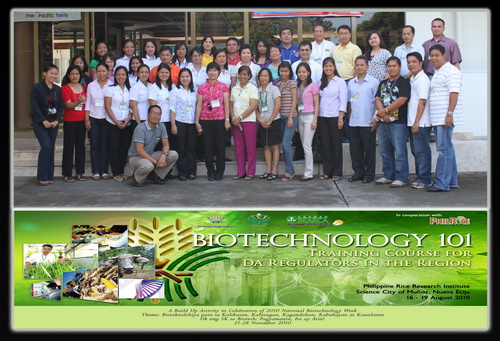
Phil Regulators and Educators Get Updates on Biotech and Biosafety Assessment
August 27, 2010| |
Thirty three participants composed of regulators from the Department of Agriculture (DA) regional agricultural offices and representatives from the Department of Education (DepEd) and Commission on Higher Education (CHED) recently gathered in a Biotechnology 101 Training Course on the Basic Biotechnology Tools for Crop/Animal Improvement which was held last August 16-19, 2010 at the Philippine Rice Research Institute in Science City of Muñoz, Nueva Ecija, Philippines.
The course provided understanding on the basics of agricultural biotechnology, and the principles involved in improving crops and livestock through conventional and modern biotechnology. Tools such as tissue culture, molecular marker technology, cloning and genetic engineering were also learned through lectures and laboratory demonstrations. In addition, the participants were informed on the policies that govern safety assessment and risk management in the country. The Philippine biotechnology regulation is considered to be a model system in Southeast Asia for being the only country to successfully assess and commercialize modern biotech products.
Biotechnology products are not offshoots of a person's imagination but rather innovations that underwent detailed scientific studies and rigorous and robust safety assessment. This was made clear by Dr. Candida Adalla, Director of the DA-BPO, in her opening remarks in the training workshop. She believes that biotechnology is the technology of the future, and pointed out that the technology could and has tremendous benefits, particularly for the Filipino people. Dr. Adalla also emphasized the critical role of regulators not only in assessing safety of biotech products but also be able to speak about biotechnology as informed persons.
Likewise, Attorney Ronilo Beronio, Executive Director of PhilRice, also shared the importance of biotechnology as a tool in addressing challenges in food security and health concerns. He informed on the current research efforts of PhilRice in the development of the Golden Rice, a GM rice that produces beta carotene, which becomes vitamin A in the body. The Golden Rice is a promising rice variety which aims to contribute to the global problem in Vitamin A deficiency. PhilRice is one of the centers of excellence in the Philippines in terms of biotech research and development. The training course was organized by the Department of Agriculture Biotechnology Program Office (DABPO), the International Service for the Acquisition of Agri-biotech Applications (ISAAA) and the Southeast Asian Regional Center for Graduate Study and Research in Agriculture (SEARCA) Biotechnology Information Network in collaboration with the Philippine Rice Research Institute (PhilRice). It was part of the build up activity in the celebration of the 6th National Biotechnology Week which is scheduled to be conducted on November 21-28, 2010.

For biotech updates in the Philippines, visit http://www.bic.searca.org or email bic@agri.searca.org.
| |
Biotech Updates is a weekly newsletter of ISAAA, a not-for-profit organization. It is distributed for free to over 22,000 subscribers worldwide to inform them about the key developments in biosciences, especially in biotechnology. Your support will help us in our mission to feed the world with knowledge. You can help by donating as little as $10.
-
See more articles:
-
News from Around the World
- Scientists Simulate Future Demands for Food and Nutrition
- New Varieties for Drought Tolerant Maize
- Egyptian Scientists and Media Discuss Challenges in Dealing with Biotech Issues
- Field Visit to Bt Maize Fields in Egypt
- Monsanto's Bt Roundup Ready 2 Yield Soybeans Approved for Planting in Brazil
- AgriLife Research Scientists Identifies Wheat Streak Resistance Gene
- Scientists Develop Soyscreen Oil to Protect Biological Agent Against Pests
- US Court Revokes Approval of GM Sugar Beets
- Scientists Develop Framework to Monitor Second-Generation Transgenic Crops
- USDA Grants Protection to 17 New Plant Varieties
- Plants Give Up Some Deep Secrets of Drought Resistance
- Castor Bean Genome Published
- Researchers Discover Novel Mechanism Protecting Plants Against Freezing
- InterGrain and Monsanto Collaborate to Advance Wheat Breeding in Australia
- BAU Celebrates 50th Year
- China Told to Develop its Own GM Food
- Phil Regulators and Educators Get Updates on Biotech and Biosafety Assessment
-
Research Highlights
- Scientists Examine Role of Cytokinin in Root to Shoot Signaling of Transgenic Tobacco
- Scientists Develop Marker System for Rice Kernel Length Elongation Traits
- A Subtilisin-like Protein from Soybean Induces Expression of Defense-related Genes
-
Announcements
- Indian Horticulture Congress 2010
- 20th International Pepper Conference
- ICAR Winter School on Molecular Techniques in Gene Isolation and Characterization
- IPBO Postgraduate Course on Biosafety
-
Resources
- USDA GAIN Report: France
- USDA Gain Report: EU
- ISAAA's Booklet on Agricultural Biotechnology (A Lot More than Just GM Crops)
-
Read the latest: - Biotech Updates (February 11, 2026)
- Gene Editing Supplement (January 28, 2026)
- Gene Drive Supplement (February 22, 2023)
-
Subscribe to BU: - Share
- Tweet
